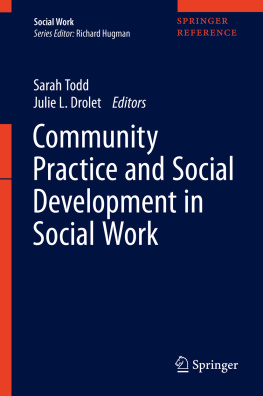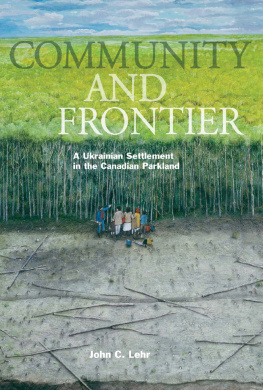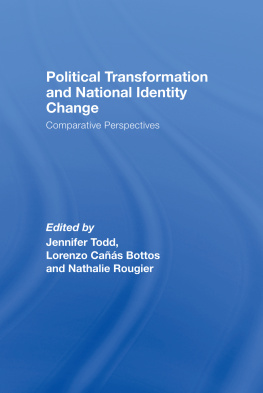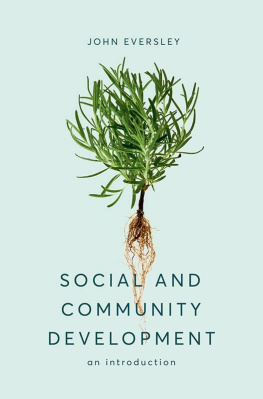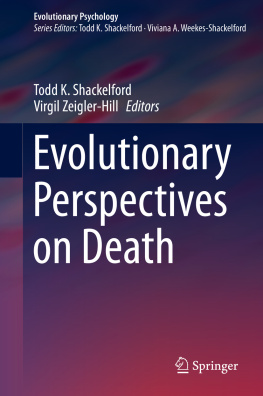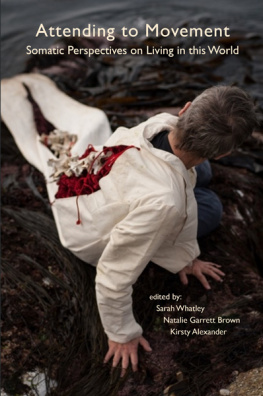CANADIAN PERSPECTIVES ON COMMUNITY DEVELOPMENT
The University of Ottawa Press (UOP) is proud to be the oldest of the francophone university presses in Canada and the only bilingual university publisher in North America. Since 1936, UOP has been enriching intellectual and cultural discourse by producing peer-reviewed and award-winning books in the humanities and social sciences, in French or in English.
Library and Archives Canada Cataloguing in Publication
Title: Canadian perspectives on community development / edited by Sarah Todd and Sbastien Savard.
Names: Todd, Sarah, 1971- editor. | Savard, Sbastien, 1969- editor.
Series: Politics and public policy (University of Ottawa Press)
Description: Series statement: Politics and public policy | Includes bibliographical references.
Identifiers: Canadiana (print) 20190207957 | Canadiana (ebook) 20190207973 | ISBN 9780776628646 (softcover) | ISBN 9780776628851 (hardcover) | ISBN 9780776628653 (PDF) | ISBN 9780776628660 (EPUB) | ISBN 9780776628677 (Kindle)
Subjects: LCSH: Community developmentCanada.
Classification: LCC HN110.C6 C36 2019 | DDC 307.1/40971dc23
Legal Deposit: First Quarter 2020
Library and Archives Canada
University of Ottawa Press 2020
Printed and bound in Canada
Copy editing
Proofreading
Typesetting
Cover design
Cover image | Robbie McCaw
Michael Waldin
discript enr.
discript enr.
Photo by Providence Doucet on Unsplash |
The University of Ottawa Press gratefully acknowledges the support extended to its publishing list by the Government of Canada, the Canada Council for the Arts, the Ontario Arts Council, and the Federation for the Humanities and Social Sciences through the Awards to Scholarly Publications Program, and by the University of Ottawa.
Table of Contents
Sarah Todd and Sbastien Savard
Lynn Frances Lavallee
Elaine Moody and Alison Phinney
Bill Lee, Mirna Caranza, Susan McGrath, and Ken Moffatt
Omer Chouinard, Andr Leclerc, Julie Guillemot, Maurice Beaudin, Majella Simard, and Gilles Martin
Dillon Black
Andr-Anne Parent and Denis Bourque
Yvan Comeau
Claudia Lahaie, Sarah Todd, and Alicia Kalmanovitch
Sbastien Savard and Dominique Charbonneau
Jane Ku
David Este and Christa Sato
Mishka Lysack
Judy MacDonald, Sarah Cooper, and Melissa Myers
Katherine Occhiuto and Sarah Todd
Sarah Todd and Sbastien Savard
Sarah Todd and Sbastien Savard
Theories in Community Work
C anada is a country of diverse people whose histories, geography, and experiences define us as distinct from one another while also linking us through shared encounters. Living in such a country requires creating a balance between respecting our different experiences and perspectives and finding commonality. Community workers play a pivotal role in sustaining this balance, and working with communities when that balance is not being achieved. Community work tends to involve working with marginalized groups around particular issues, often either to secure material resources or to gain recognition. The specificity and diversity of community practice in this country has presented a challenge in terms of how we come to think about Canadian approaches to community work. Practice with communities is not only part of geographically centred conversations but has always been interdisciplinary, drawing on theories from a range of disciplines, including development studies, sociology, political science, and social work (itself interdisciplinary). As such, the community practice is informed by a wide array of theories about how one can make sense of the world, and these are then renegotiated within local contexts shaped by regional discourses, policies, and priorities.
Canadian books on community development have tended to be less theoretical and more pragmatic in orientation (Bourque et al. 2007; Kuyek 2011; Lavoie and Panet-Raymond 2014; Lee 2011; Parada et al. 2010; Shragge 2009). At the same time, those learning about community work tend to draw upon American or British literature to understand the overarching frameworks and foundational theories that inform their practice (see, e.g., Butcher et al. 2007; Hardcastle, Powers, and Wenocur 2011; Weil, Reisch, and Ohmer 2013). From our perspective, this has resulted in a couple of important limitations that we address in this text. First, while Canadian community organizers make sense of their experiences through American or British theories, reworking them within the Canadian context, there is very little written about how this application then feeds back into the theories themselves, reorganizing and enriching them. The American approaches we borrow from, such as capacity building (Kretzman and McKight 2006), collective impact (Kania and Kremer 2011), or others, evolve and shift once they are deployed in a Canadian context, and we would suggest important conceptual and practical innovation happens when this takes place. Over our years of teaching community work, we have struggled to find theory-rich texts for our graduate students. We hope this text contributes examples of Canadian practice that is situated in well-explained and historicized notions of how community work in Canada makes sense of concepts such as justice, community, and social change as they are reconfigured through our histories, geographies, politics, and social relations. These are, importantly, not singular. The boundaries around the notions of Canada are continually manufactured through our imagined national identity, but also through our local, provincial, and national laws and policies. It is important, from our perspective, that we understand how these contexts interact with the theories that we, as community workers and scholars, use to make sense of our organizing histories and contemporary experiences.
In addition, there has been insufficient communication between different groups working and writing about community practice in Canada. In particular, we are concerned with the lack of conversation between francophone and anglophone community organizers in this country. This is not only a matter of language, though that is significant. Canada is now a multilingual country, but the different ways in which the state relates to community organizing in anglophone and francophone Canada shapes and creates unique approaches to community work here. There are also historical and cultural differences that make the terrain for the reinterpretation of theory rich and ever present. This same distinction needs to be made for community work with Indigenous peoples in Canada, which also has its own history and contemporary practices (Absolon and Hebert 1997; Anderson and Lawrence 2004; Baskin 2011; Blaser, Feit, and McCrae 2004; Gilio-Whitaker 2015; Kino-nda-niimi Collective 2014; McMillan, Young, and Peters 2013; Shantz, 2010; Silver et al. 2006). While the problematic legacies of ethnocentric community work remain, Indigenous communities are challenging and teaching non-Indigenous Canadians about their own knowledges and approaches to community work (Baskin 2011). It is centrally important that Canadian discussions of community theory account for how a wide range of world views are used in practice within our particular shared and separate histories and contexts.





